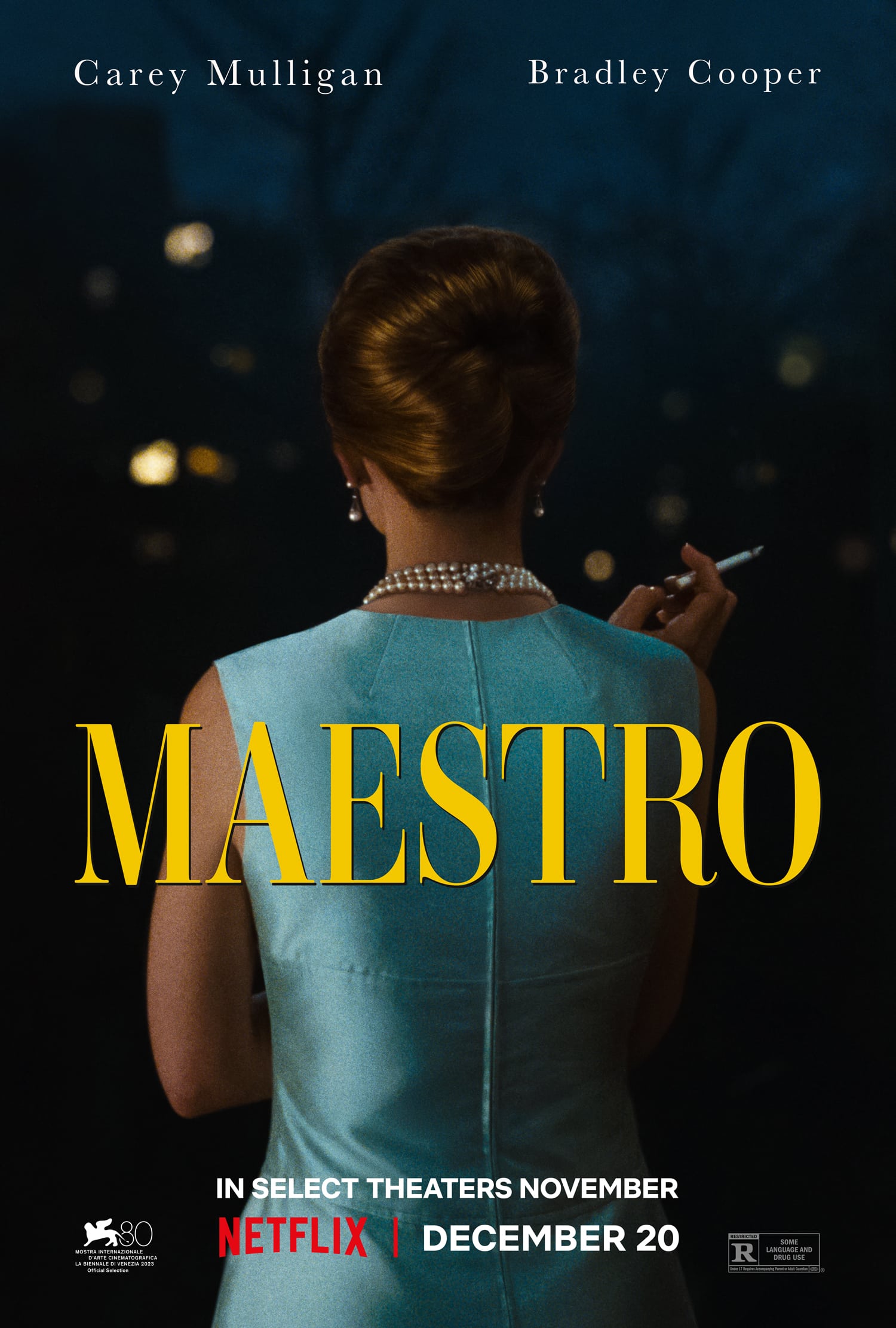
- Starring
- Bradley Cooper, Carey Mulligan, Matt Bomer
- Writer
- Bradley Cooper, Josh Singer
- Director
- Bradley Cooper
- Rating
- 14A (Canada), R (United States)
- Runtime
- 129 minutes
- Release Date
- November 22nd, 2023 (theatrical)
- Release Date
- December 20th, 2023 (Netflix)
Overall Score
Rating Summary
Maestro is a biopic detailing the life and career of legendary American composer, Leonard Bernstein (Cooper) through the lens of his marriage to Felicia Montealegre (Mulligan). Spanning multiple decades, from his big break to his final days; aspect ratio changes, black and white to color, phenomenal old age makeup work, and other stylistic tricks are all employed to great effect to detail the passage of time. Above all else, the film is a dazzling technical showcase of performance and direction. Cooper and Mulligan fully immerse themselves into their respective roles, delivering some of the best work in their careers. In the 5 years since Cooper’s directorial debut, A Star is Born, he appears to have upped his game with a precision and confidence behind the camera equivalent to far more experienced filmmakers. Those mentoring lessons from Clint Eastwood, Steven Spielberg and Martin Scorsese seemed to have paid off. If only the storytelling and script matched the formal ambitions on screen.
Amidst the glamour and spectacle, Maestro follows the same music biopic structure as any other with a chronological retelling of the events in Bernstein’s life. The structure almost feels like a checking points off of a list: and then this happens and then this happens and then this happens. It seems at odds with the ambition and passion of the filmmakers, and fails to convey a sense of the man or the artist. Audiences are told that he’s a genius and the glimpses of his composing are quite impressive, but the film is more concerned with his personal life and how his desires and creative impulses took over his family and served as a safety net for his own insecurities. His closeted bisexuality is a recurring theme throughout the film, that lack of feeling whole masked with an extrovert personality and his art.
That push and pull between his personal and professional lives, his extramarital affairs, and his family life was further complicated by Felicia knowing about it all and then choosing to standing by him, seemingly to keep their family together. As a result of Bernstein’s codependence on others, her choice meant that she essentially sacrificed her happiness for his artistic success. Fascinating and compelling emotional hooks that should have driven the film forward unfortunately never feel anything more than empty and distant. Much of the story is executed as a surface level examination, never feeling like a thorough analysis of Bernstein’s life. While that path could have been a deliberate choice, there are so many conversational scenes shot from afar, while there are just as many scenes shot as one take close ups so it become difficult to decipher whatever was the original intent. Stylistic choices that don’t line up with the material make for a film that is more style over substance. But what a beautiful style it was!
Despite some narrative misgivings and a lack of an emotional connection with the drama, the film still warrants a recommendation purely on technical merit alone. For those who are lucky enough to find Maestro playing in a Dolby Atmos equipped cinema, it is a must-see for its concert scenes alone. Audiences will be treated to thunderously booming music that will shake seats and stir their souls to the point that they are really attending those performances. There is so much attention to detail and passion behind and in front of the camera that is clear to see. Contrasted with archive footage of Bernstein in action over the credits, it’s remarkable how spot on Cooper captured his conducting, arguably like a man possessed. That being said, for as much sweat and tears poured into the technical side of the film, that same love is never represented in the actual text. Cooper is undoubtedly a talented performer with a strong directorial eye but maybe he should leave the writing to someone else next time.
In the end, Bernstein’s music was a way for the man to communicate what his heart and soul was saying to him. For whatever reason, that same feeling of inner release is missing from Cooper’s film.
still courtesy of Netflix
If you liked this, please read our other reviews here and don’t forget to follow us on Twitter or Instagram or like us on Facebook.
Discover more from
Subscribe to get the latest posts sent to your email.

